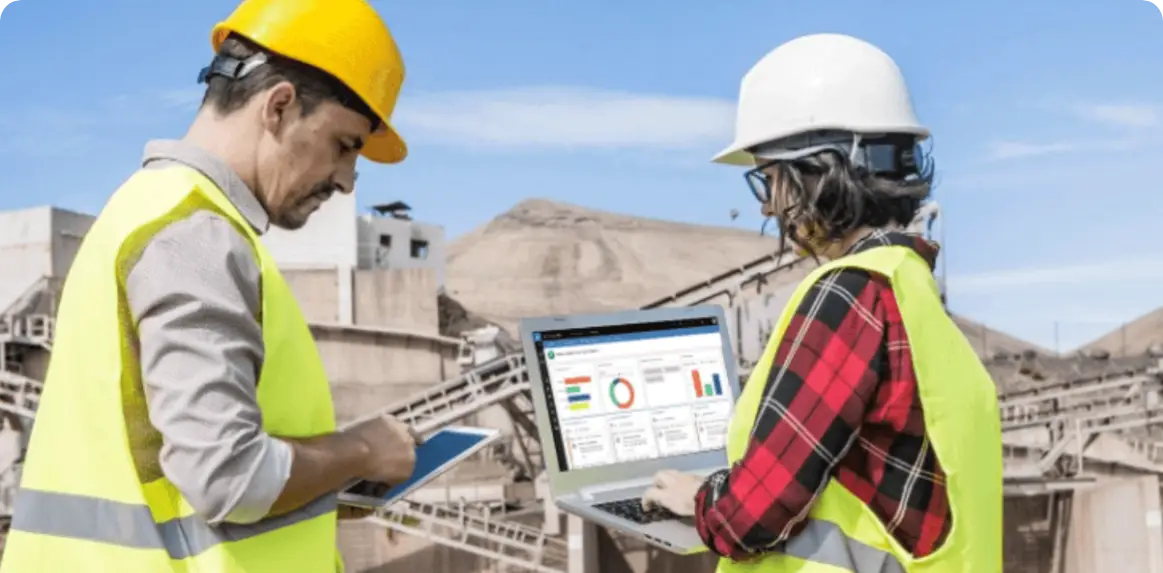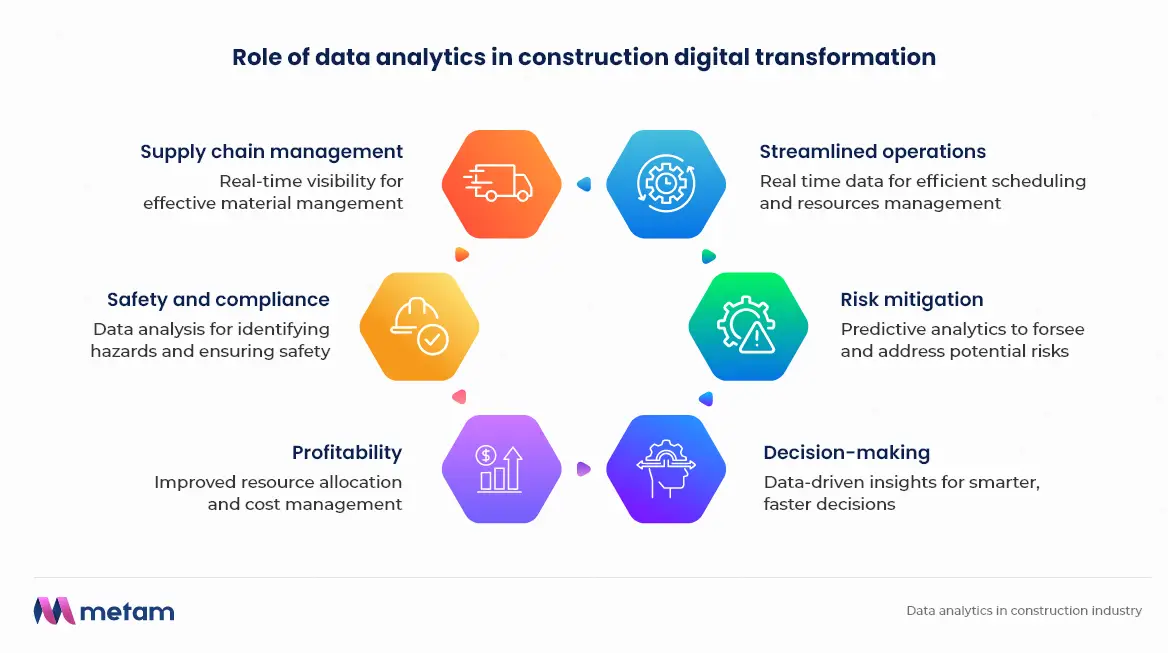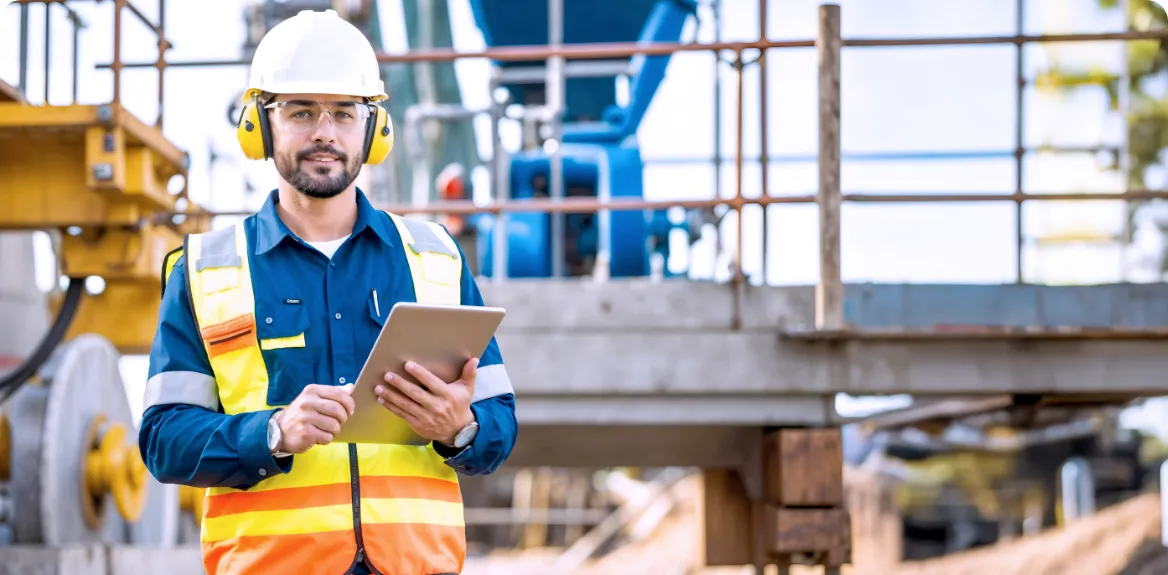Data analytics in construction industry
by
Metam technologies

Abstract
Data analytics is transforming the construction industry by improving efficiency, cost management, and decision-making. Tools like AI, predictive analytics, and IoT help optimize operations and mitigate risks.
Table of Content
What is construction data analytics?

The role of data analytics in construction's digital transformation

How data analytics improves key aspects of construction operations?

What are the key trends in construction data analytics for 2025?

How can construction firms maximize the benefits of data analytics?

Metam Technologies data analytics construction solutions

The construction industry has long been synonymous with complex processes, high costs, and time-consuming operations. However, the advent of digital tools, particularly data analytics, is changing how construction firms operate.
Data analytics in construction has emerged as a key driver of efficiency, cost savings, and enhanced decision-making. By leveraging data, construction companies can gain deeper insights, optimize operations, and improve the overall management of projects.
Let’s explore the transformative role of data analytics in the construction industry. It delves into its practical applications, explores the ongoing digital transformation, and outlines future opportunities that data analytics offers for the sector.
Whether you're a construction manager, contractor, or consultant, understanding how data analytics is reshaping construction practices is crucial for staying competitive and optimizing project outcomes.
What is construction data analytics?
Construction data analytics refers to the process of collecting, cleaning, processing, and analyzing vast amounts of data to uncover actionable insights that drive project success. In construction, this data comes from various sources, including project budgets, schedules, resource allocation, and real-time progress tracking. With the help of advanced tools and software, construction firms can utilize data from across the project lifecycle to streamline operations, make informed decisions, and ultimately enhance overall project performance.
The value of data analytics in construction lies in its ability to handle both structured and unstructured data, a crucial element for understanding complex project details. By applying statistical models, machine learning algorithms, and predictive analytics, companies can forecast potential risks, optimize workflows, and improve resource management. For example, by analyzing trends in project delays, firms can better allocate resources and adjust schedules to avoid bottlenecks.
With the growing complexity of modern construction projects, the ability to use data effectively has become essential for managing costs, timelines, and safety. Data analytics empowers construction firms to go beyond traditional methods of decision-making and embrace a more data-driven, proactive approach to project management.
The role of data analytics in construction's digital transformation
The construction industry is undergoing a profound shift towards digital technologies, with data analytics playing a pivotal role in reshaping how projects are managed, executed, and optimized. With the global construction analytics market expected to reach $4.5 billion by 2026, growing at a compound annual growth rate (CAGR) of 18.0% from 2021, it’s evident that data-driven strategies are becoming indispensable for success in the sector. (Source : Research and Markets)

As this digital revolution accelerates, construction firms are leveraging data analytics to:
- Streamline operations: Real-time data allows for more efficient scheduling, resource management, and project tracking, reducing delays and improving productivity.
- Predict and mitigate risks: Predictive analytics enables firms to foresee potential risks and proactively address them, minimizing costly project setbacks.
- Enhance decision-making: Data-driven insights provide actionable information for making smarter, faster decisions that optimize project outcomes.
- Boost profitability: By improving resource allocation, reducing waste, and enhancing cost management, companies can increase profitability and maintain better control over budgets.
- Improve safety and compliance: Analyzing safety data allows for the identification of potential hazards, enabling firms to implement measures that ensure safer work environments and compliance with regulations.
- Optimize supply chain management: Data analytics can provide real-time visibility into supply chain performance, helping companies forecast material needs, reduce delays, and avoid cost overruns by better coordinating deliveries and inventory.
With data analytics at the core of the digital transformation, construction companies are not just adopting new tools but reshaping the way they approach every aspect of their operations. Those who embrace these changes will be better positioned to stay competitive and thrive in an increasingly data-centric industry.
How data analytics improves key aspects of construction operations?
Data analytics isn't just about handling numbers, it's about transforming the way construction companies operate. From project management to equipment maintenance and resource optimization, the benefits of data analytics are vast and multifaceted.
Project management and scheduling
Efficient project management is essential to completing construction projects on time and within budget. Data analytics allows construction firms to track and adjust project timelines in real time. Advanced project management software, powered by data analytics, enables project managers to allocate resources more efficiently, track progress, and predict potential delays before they become significant issues. By utilizing historical data, managers can optimize project schedules and workflows to maximize productivity.
Predictive maintenance and equipment management
Construction projects rely heavily on equipment, and downtime due to equipment failure can be costly. Data analytics can help firms predict when machinery and tools are likely to break down, based on historical performance data. Sensors installed on construction equipment send real-time data to analytics platforms, providing insights into the health of the machinery. Predictive maintenance tools help identify potential issues before they lead to breakdowns, reducing costly repairs and minimizing unplanned downtime. By extending the life of equipment and reducing maintenance costs, companies can significantly improve project efficiency.
Cost reduction and resource optimization
The construction industry is notorious for cost overruns and resource inefficiencies. Data analytics can help firms address these issues by providing in-depth insights into material usage, labor deployment, and resource allocation. Analytics tools can identify wasteful practices and recommend changes that lead to better resource management. By fine-tuning material procurement and improving labor scheduling, companies can cut costs while maintaining the quality of their projects. These cost-saving benefits also contribute to more competitive pricing and increased profitability.
What are the key trends in construction data analytics for 2025?
As the construction industry continues to evolve, data analytics is set to play an even more significant role in 2025. Emerging technologies and innovative approaches are expected to further reshape how construction firms manage projects, improve efficiency, and drive sustainability.
Staying ahead of these trends will be crucial for construction companies looking to maintain a competitive edge in an increasingly digital and data-driven world. Here are the key trends in construction data analytics for 2025:
- AI and machine learning : AI and machine learning (ML) are transforming the construction sector by analyzing vast amounts of data to predict project outcomes, identify risks, and enhance scheduling. These technologies enable predictive capabilities that help construction teams anticipate problems and make data-driven decisions to keep projects on track and within budget.
- Blockchain : Blockchain is revolutionizing the way data is stored and shared in the construction industry. Its decentralized, tamper-proof ledger ensures secure data management and enhances transparency throughout the project lifecycle. With blockchain, companies can track material deliveries, manage contracts, and reduce fraud risks, ultimately increasing project accountability.
- Sustainable construction : As the construction industry moves toward sustainable practices, data analytics plays a vital role in reducing environmental impact. With the ability to track carbon emissions, energy consumption, and waste, construction firms can make more informed choices that help reduce their carbon footprint, improve resource efficiency, and comply with environmental regulations.
- Digital twin technology: Digital twin technology, which creates virtual replicas of physical assets, is becoming increasingly important for the construction industry. By integrating AI and IoT sensors, digital twins enable real-time monitoring, project optimization, and predictive maintenance. This allows construction firms to make smarter decisions throughout a project’s lifecycle, from design through operation.
- IoT integration for real-time monitoring: The Internet of Things (IoT) is enhancing construction data analytics by providing real-time data through connected sensors embedded in equipment, materials, and structures. IoT technology improves decision-making by enabling construction firms to track progress, optimize resource allocation, and manage assets more efficiently across the entire project lifecycle.
- 5G connectivity for enhanced data flow: With 5G technology, the construction industry can experience faster and more reliable data transmission, enabling efficient communication and real-time project management. The high-speed connectivity of 5G will facilitate seamless data sharing across construction sites and remote locations, making it easier for teams to collaborate and manage complex projects.
- Advanced predictive analytics : Predictive analytics is becoming more advanced, providing construction firms with the ability to identify and mitigate risks before they escalate. By analyzing data from past projects, weather forecasts, and operational conditions, predictive models can forecast potential delays, safety hazards, and budget overruns, ensuring better project outcomes and reducing costly mistakes.
- Cloud-based construction analytics: Cloud-based solutions are becoming increasingly popular for construction firms looking to streamline operations and improve collaboration. These platforms enable real-time data access and sharing across all project stakeholders, no matter their location. Cloud-based construction analytics also provide scalability, so firms can easily expand their data storage and processing capabilities as their project needs grow.
How can construction firms maximize the benefits of data analytics?
To fully capitalize on the benefits of data analytics, construction firms must adopt advanced tools and practices that foster data-driven decision-making across all stages of a project. Here are key strategies to help firms unlock the potential of data analytics:
- Partner with data analytics experts: Partnering with data analytics experts can significantly enhance a construction firm’s ability to harness the full potential of data. Experts bring industry-specific knowledge, advanced tools, and tailored solutions that can help companies unlock valuable insights, solve complex problems, and achieve superior project outcomes. Collaborating with specialists ensures that construction firms remain on the cutting edge of data-driven construction practices.
- Invest in advanced analytics tools and solutions: Modernizing construction operations with advanced data analytics solutions platforms can revolutionize project management. Tools that offer real-time insights into scheduling, budgeting, and resource allocation provide invaluable support to construction teams. By leveraging these platforms, firms can increase operational efficiency, reduce risks, and drive profitability.
- Leverage predictive analytics: Predictive analytics tools help construction firms stay ahead of potential issues by forecasting risks and bottlenecks before they occur. By using predictive models, companies can optimize project schedules, manage costs more effectively, and minimize downtime. This foresight gives firms a competitive edge, ensuring projects are completed on time and within budget.
- Enhance communication through data sharing: Real-time data sharing improves communication among all project stakeholders. By fostering collaboration and ensuring everyone has access to the same information, construction teams can work more efficiently and avoid costly miscommunications. Data sharing also promotes transparency and accountability, which is essential for managing complex projects.
- Focus on safety through data insights: Using data to track and analyze safety metrics can help construction firms create safer work environments. By identifying trends in workplace accidents and near misses, firms can take proactive measures to reduce risk and improve safety protocols. Ultimately, this enhances employee well-being and reduces the likelihood of costly delays due to accidents.
- Embrace AI, ML, and blockchain for future-proofing: To stay ahead of the competition, construction firms should explore emerging technologies like AI, machine learning, and blockchain. These tools offer advanced data management capabilities that can improve decision-making, increase transparency, and optimize project performance.
Metam Technologies data analytics construction solutions
The construction industry is undergoing a digital revolution, and data analytics is at the heart of this transformation. By embracing the latest data-driven solutions, construction firms can optimize their operations, reduce costs, improve safety, and enhance project outcomes.
At Metam Technologies, we specialize in delivering tailored data analytics solutions designed to meet the unique needs of the construction industry. Our advanced tools assist companies in navigating the complexities of modern projects, offering capabilities ranging from real-time progress tracking to predictive analytics that enable smarter, faster decision-making.
Through our adaptive technology, construction firms can optimize every phase of the construction process, ensuring they remain ahead of the curve and outperform competitors in an increasingly digital marketplace.
By partnering with Metam Technologies, construction companies can secure a competitive edge, positioning themselves at the forefront of the industry's ongoing digital transformation. Whether managing large-scale infrastructure projects or smaller developments, our customized analytics solutions help streamline operations, enhance decision-making, and ultimately drive greater project success.

Construction compliance...
This article explores the transformative role of compliance automation in construction health and safety management,...




